Donald Trump is the tool we use to play the game theory of Bitcoin, and it will generate unimaginable dividends in the next four years.
By Zeke Faux, Bloomberg
Translated by Luffy, Foresight News
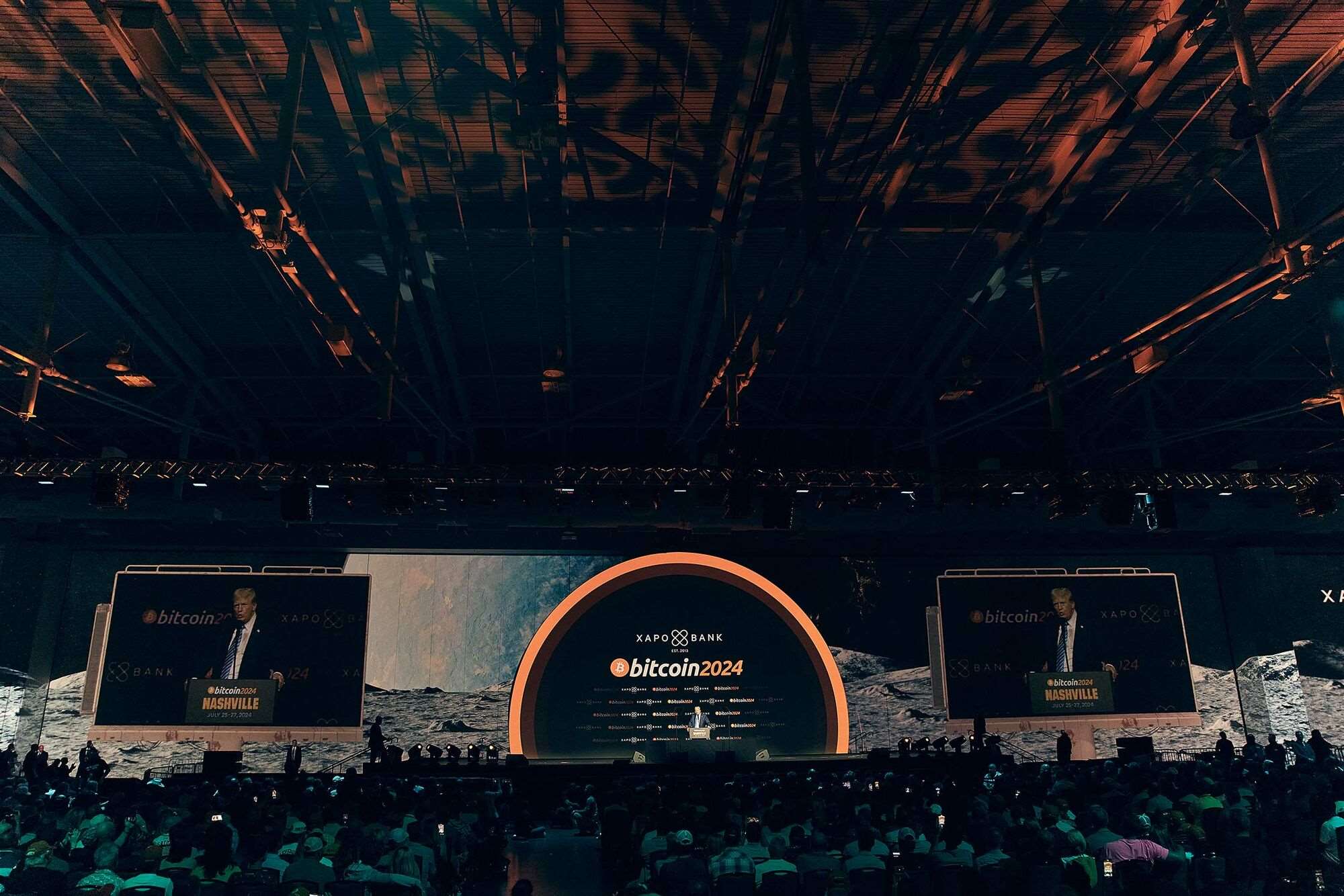
About a week before Donald Trump took the stage in front of 8,000 Bitcoin fans in Nashville on July 17, Bitcoin Magazine CEO David Bailey enthusiastically explained how he and his friends managed to get the presidential candidate to attend the conference. Bailey, 33, with a baby face and a thick beard, appeared on a podcast called Galaxy Brains, where he told the host that the whole thing was so crazy, he was keeping a diary to record everything that was happening. Bailey said, "I won't publish this content because no one will believe it's true."
Why was Bailey so excited? The reason is not hard to understand. Trump was going to attend a conference hosted by Bailey's company, a conference for faithful believers in Bitcoin who are convinced that Bitcoin is the only true cryptocurrency and the future world currency. Just a few years ago, this conference was as marginalized as a clown party, when Trump publicly called Bitcoin a "scam"; now, he was going to endorse Bitcoin on stage.
Bailey said that he had spent almost four months of his time to get Trump to attend the conference. Despite the fact that the former president has always been a critic of cryptocurrency, he had collaborated with the co-author of the 2007 book "Think Big and Kick Ass" to create a series of non-fungible tokens (NFTs) called "Trump Digital Trading Cards". These NFTs essentially feature cartoon images of Trump with muscular superheroes, hunters, soldiers, etc., priced at $99, and Trump held an event for NFT buyers at his Mar-a-Lago club in May. There, he showed a more open attitude towards cryptocurrency. Bailey immediately took action and arranged meetings with industry insiders and the campaign team.
"The campaign team, like a bunch of bullshit artists trying to sell junk, if you want to make progress (Bitcoin gaining recognition and support), you have to show them the money," Bailey said.
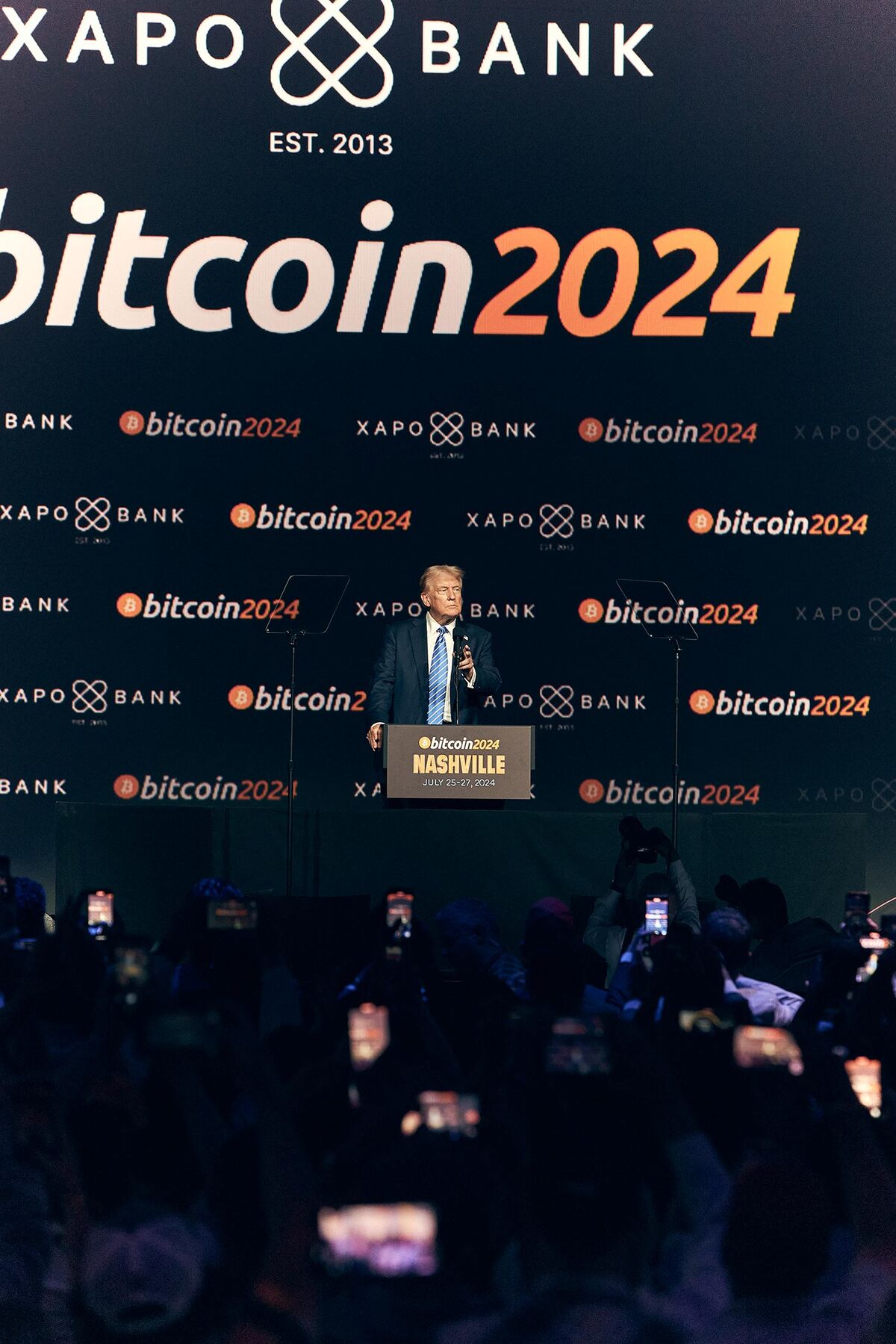
Donald Trump speaking at the Bitcoin 2024 conference in Nashville
Bailey told the podcast host that he was just making an analogy, referring to the process of building enthusiasm. But he did it, he organized a fundraising event for Trump, where top tickets required a donation of $844,600 to Trump and the campaign committee, the maximum amount allowed by campaign finance law. Only 10 people donated this much. "A lot of money," Bailey said, "but far from enough to sway a party's views. "I was shocked to find that over time, a very small number of people can have such a big impact." (In a later interview, Bailey downplayed his role in persuading Trump, saying that many people around Trump were already interested in Bitcoin, and the candidate's support was not due to donations from the industry. "Campaign funding follows relevant policies," Bailey said.)
In the podcast, Bailey described Trump's appearance as a step in a larger plan. Bailey speculated that if Trump were elected, he might announce a plan to establish a strategic reserve of Bitcoin, similar to the way the United States reserves gold in Fort Knox. This plan would certainly drive up the price of cryptocurrency, and other countries might start buying and hoping to beat the United States to it. If Trump were to tell China that Bitcoin is crucial to the United States, China might revoke its ban on cryptocurrency and buy Bitcoin. Bailey said, "If we want China to buy Bitcoin, all we have to do is have someone say that we are preventing them from buying Bitcoin." He added that the price of a Bitcoin could reach $1 million.
"As faith spreads, so does our financial power," Bailey said, "you can't beat it."
For those familiar with the disruptive origins of Bitcoin, it seems contradictory that Bitcoin, an anonymous and untraceable digital cash, is being lobbied to be accepted by former and future U.S. presidents. But since Satoshi Nakamoto (an anonymous individual or group) invented Bitcoin 15 years ago, Bitcoin has failed to gain widespread acceptance as a currency.
Bitcoin enthusiasts now call it a "store of value". They call it "digital gold" and talk about how Bitcoin will only ever have 21 million coins, unlike the fiat currencies printed at will by central banks. For skeptics, what they seem most concerned about is the rising price of Bitcoin, which sometimes sounds more like a pyramid scheme. From this perspective, Trump represents the ultimate goal of Bitcoin, as he could bring the U.S. government to the bottom of the pyramid, triggering a global rush to buy Bitcoin and making those at the top of the pyramid exceptionally wealthy.
Since Bailey held the conference in 2021, I have often heard stories about Bitcoin conferences over the years. When I saw crypto brothers crying when the president of El Salvador announced that Bitcoin would be the country's legal tender, I mocked their logic of "El Salvador first, then the world". Later, I went to El Salvador and found that the plan had failed. I wrote a book about it (Number Go Up), and found that the plan was completely foolish and full of fraud. The likelihood of Bitcoin holders selling their assets to the Federal Reserve seems as likely as me taking my children's artwork out of the fridge and selling it to the National Gallery of Art.
Back to the present, cryptocurrency prices are rising, and the most fervent supporters of Bitcoin have the support of someone who is likely to be the next president. I had to see for myself whether he would fully support cryptocurrency.
"Donald Trump is the tool we use to play the game theory of Bitcoin," Bailey said, "and it will generate unimaginable dividends in the next four years."
On Friday morning, as I walked into the Bitcoin conference held at the Nashville Music City Center, I found that the conference was no different from others I had attended, except for the red capital letters printed with "Make America Great Again" or "Make Bitcoin Great Again". More typical were the orange "B" symbols seen everywhere. Enthusiastic fans were selling Bitcoin children's books, Bitcoin blankets, and embarrassing Bitcoin artworks with more orange "B" symbols and burnt, crushed, or torn government currency. (Trump never missed an opportunity to promote products, and later he promoted orange Bitcoin sneakers on Truth Social.) A model in a bikini sprayed herself with water heated by a Bitcoin miner. I also saw Hailey Welch, who became famous for "hawk tuah", lingering in front of a booth selling orange underwear.
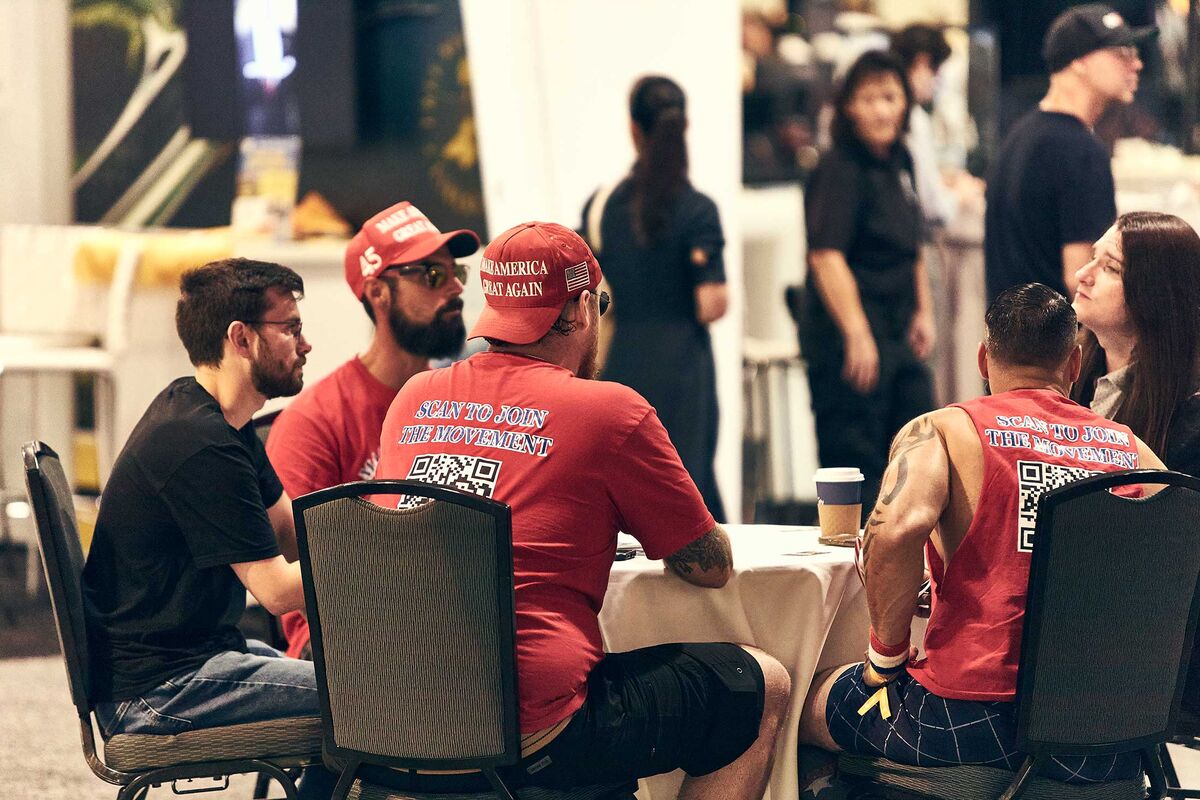
Participants at the conference wearing MAGA clothing
This event was not like a technical hacker marathon, but more like a marketing conference, aimed at mobilizing salespeople to promote products to friends and family when they return home. The concept of the event was the "orange pill", which metaphorically means that when a person's mind is liberated, they begin to accept Bitcoin, just like Neo played by Keanu Reeves in "The Matrix". "Our whole office has taken the orange pill," said a woman from Jersey City, wearing an orange work uniform embroidered with "Bitcoin Orthodontist".
On stage, there was no encouragement to discuss cryptocurrencies other than Bitcoin among the attendees. I didn't hear any discussions about many cryptocurrency scams, such as Sam Bankman-Fried's FTX. For this group of people, the only Ponzi scheme is the Federal Reserve, as they claim that the Fed is printing unsustainable currency that will lead to the collapse of the US dollar. Many people I spoke to host Bitcoin parties in their hometowns or have Bitcoin podcasts or small businesses related to Bitcoin. A woman handed me an advertisement card promoting a science fiction novel related to Bitcoin, telling me she was "one of the author's wives". Finally, I had a long discussion with the owner of an appliance store about whether the adoption of Bitcoin would lead to the production of more durable refrigerators and dishwashers for the company.
Many experts attribute Trump's inconsistency on Bitcoin to his pursuit of the so-called large "cryptocurrency voting" group. They often cite a survey released by Coinbase Global Inc. last year, which found that 20% of American adults own cryptocurrency. Tennessee Republican Senator Bill Hagerty told me at the conference, "There are tens of millions of voters in the United States who have invested in cryptocurrency."
Even if this is true (a survey by the Federal Reserve in May found that only 7% of adults own cryptocurrency), in my opinion, relaxed financial regulation is unlikely to be the most important political issue for most people. So, what about those who have been scammed? Comedian Nikki Glaser may have attracted mainstream attention at a roast for Tom Brady on Netflix. At the time, she joked about the former NFL quarterback losing money on cryptocurrency and mentioned his famously foolish teammate Rob Gronkowski. She said, "Even Gronk said, 'I know that's not real money'."
Swing voters in the cryptocurrency industry at the conference seemed elusive. Most attendees told me they support Trump, or support independent candidate Robert Kennedy, who is more outspoken in his support for Bitcoin. "I'm still undecided," said a truck driver from Cincinnati, who asked me to call him Colonel Stacker. (Kennedy was overshadowed by Trump at the conference, and he said he was not upset about it.)
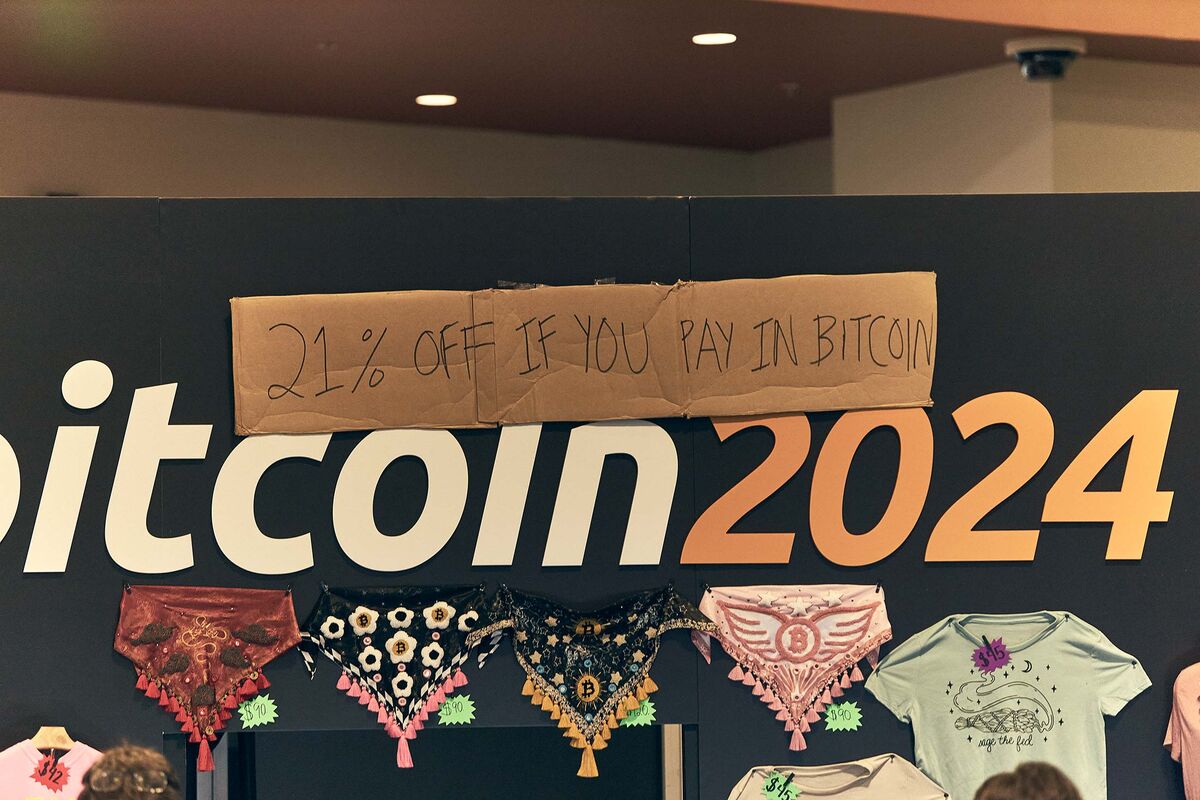
Discounts for purchasing clothes and scarves with Bitcoin
Cryptocurrency swing voters are at the top of the cryptocurrency industry, and when FTX's Bankman-Fried was still the most famous political participant in the industry, the industry tended to favor the Democratic Party. The political action committee Fairshake, supported by cryptocurrency companies, has raised over $200 million, more than any other super PAC in this election, and has stated that it will support crypto-friendly politicians from both parties. However, most of Fairshake's funding comes from companies sued by the U.S. Securities and Exchange Commission or venture capitalists who have invested in sued companies, making them natural opponents of the Biden administration (SEC Chairman Gary Gensler has taken a aggressive stance on cryptocurrency), and aligned with Trump, who has long complained that fraud lawsuits against his businesses are illegitimate. In a podcast last month, Ben Horowitz, co-founder of venture capital firm Andreessen Horowitz, which donated $44 million to Fairshake, said that the Biden administration's attack on cryptocurrency "subverts the rule of law". Horowitz said he would vote for Trump and reportedly plans to donate a large sum of money to Trump's campaign. (Bloomberg LP, which owns Bloomberg Businessweek, is one of the investors in Andreessen Horowitz.)
On Friday afternoon, one of the most influential Bitcoin advocates, Michael Saylor, took the stage to speak. He is the 59-year-old chairman of software company MicroStrategy Inc. Since 2020, he has invested billions of dollars from MicroStrategy into Bitcoin, reaping huge returns. (Saylor and MicroStrategy also agreed to pay $40 million in June to settle a tax fraud lawsuit, but did not admit to any wrongdoing.) Several attendees told me that they learned about Bitcoin through Saylor's speeches, which have millions of views online.
Some people in the crowd lined up for a long time just to hear Saylor's speech, and he did not disappoint. He was wearing a dark suit and a red tie similar in length to Trump's, and he explained in his slides why countries should buy Bitcoin. This was to be expected, as he predicted that by 2045, the price of a Bitcoin would increase 190 times to reach $13 million.
"You will become very wealthy," he said.

Booths at the Nashville Bitcoin 2024 conference
On Friday evening, a few hours after Saylor's speech, I went to a hotel near the conference center, where little Donald Trump and former Fox News host Tucker Carlson planned to attend a peripheral event sponsored by the cryptocurrency $MAGA, which aimed to call for "Make America Great Again", one of the many Memecoins hoping to join the movement.
The two and little Trump's fiancée, another former Fox News host Kimberly Guilfoyle, got out of a large black SUV. Carlson had invited Saylor to his Fox show in 2021 to talk about Bitcoin. When I asked him if he had given Donald Trump the orange pill, he almost laughed out loud. "I hope so," he said. When I asked little Trump if he supported the MAGA Memecoin, he told me he was just there to visit friends.
Shortly after, Bailey also arrived. He told me that Trump's change "was not his doing at all" and then went straight to the event. I had previously applied for media accreditation, but an organizer rejected me, citing a quote from my book: "From the beginning, I thought cryptocurrency was very stupid. It turned out to be even stupider than I imagined." Fortunately, there was a live broadcast. While little Trump and Carlson were speaking, members of a Telegram chat room dedicated to tokens were insulting each other and sharing memes from the 2004 satirical film "Team America: World Police". "I love this community," little Trump said, "you are all pioneers."
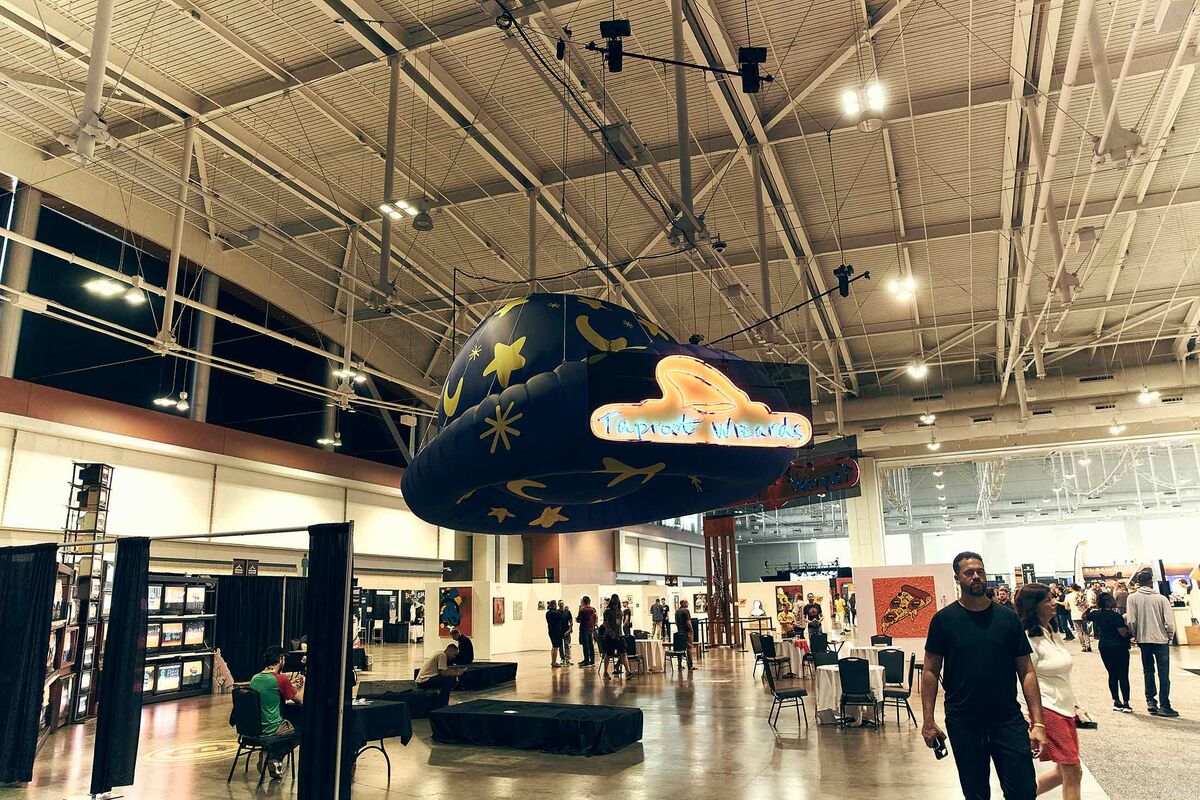
Trapoot Wizards balloons at the Nashville Bitcoin 2024 conference
I went to another rooftop party, which was hosted by the team behind Taproot Wizards, a series of seemingly shabby wizard NFTs. There, amidst a group of men wearing wizard hats discussing Bitcoin, I encountered a surprising figure: Heather Morgan, better known as Razzlekhan, a notorious rapper who dubbed herself the "Wall Street Crocodile" and helped launder the proceeds of a $4.5 billion Bitcoin hack, the largest theft in history.
Morgan later pleaded guilty, but her bail conditions apparently allowed her to attend a Bitcoin party. She was dressed in a black dress with a belt and fishnet stockings, chatting with the famous rapper Lil Pump, who launched his own token in June. One of the men wearing wizard hats tried to incite them to a rap battle.
Ironically, if Trump were to follow Bailey's advice to establish a Bitcoin reserve, Morgan would also bear the same responsibility: most of the Bitcoin held by the U.S. government was confiscated from her and her husband. When I introduced myself, Morgan pulled down her black hat and walked away quickly.
Another self-proclaimed wizard pulled me into a conversation. "David Bailey has been working hard for all of us," he said.

Pizza Ninja at the Bitcoin 2024 conference
The next day, I arrived three hours before Trump's speech. The organizers said the auditorium could accommodate 8,000 people, but there were not many seats left, yet I managed to grab a seat towards the back.
"The big man just landed," host TJ Miller said, a curly-haired comedian who had left the show "Silicon Valley" amid allegations of misconduct, which he denied.
Fundraising events were also taking place elsewhere in the building. A woman from the company at my table had developed a MAGA-themed token and said her colleagues had paid $100,000 to have their photo taken with Trump.
A guard escorted a man wearing a golden full-face mask past me. It was said that he was a billionaire who had invested in a cryptocurrency called Shiba Inu, a knockoff of Dogecoin.
While we waited, retired U.S. Representative Ron Paul appeared via video at the conference. "Bubbles always burst," he said. The crowd murmured, and I found it difficult to hear him, but I was fairly certain he was talking about the dollar.
When it was time for Trump's speech, he was nowhere to be seen. There were rumors that he was waiting for Elon Musk to arrive. To keep the audience entertained, the organizers played an ad for a new documentary called "God Bless Bitcoin". The documentary is available for free on YouTube, and its title seems to be quite literal.
Trump arrived about an hour late and Elon Musk was still absent. He sang a melancholic country folk song, "God Bless the USA", which has become his anthem. After mentioning the recent Hezbollah attack on Israel, he began talking about how Bailey had brought him to the conference. Trump clearly respected Bailey's marketing skills.
"I took a picture, it was published, Trump and David Bailey, and your industry just took off," Trump said, raising a hand over his shoulder. "So David, congratulations, whatever you do, you do it great."
He then thanked many of the influential figures present. MicroStrategy's Saylor, fund manager and Bitcoin advocate Cathie Wood, and Howard Lutnick of Cantor Fitzgerald were praised, the latter having delivered an angry speech earlier in defense of Tether Holdings Ltd., the controversial issuer of the Tether stablecoin and a client of his bank. Trump praised YouTuber-turned-boxer Jake Paul, who I later found out had paid about $100,000 to settle charges with the U.S. Securities and Exchange Commission (SEC) last year for promoting cryptocurrencies without disclosing compensation. (He neither admitted nor denied the charges.)
Trump also praised the Winklevoss brothers, Cameron and Tyler, who agreed to pay $50 million in June to settle a fraud lawsuit brought by the New York Attorney General against their cryptocurrency exchange. "They are male models with beautiful brains," he said. Trump praised everyone present, calling them "very smart people" and saying they "have the spirit of America's pioneers".
I think that's all the Bitcoin supporters could hope for. While Trump did mention "Crooked Hillary" and "Windfall in the Wind", he reiterated some of the same points I heard from Bitcoin supporters and cryptocurrency lobbyists. In addition to the claims from the Coinbase survey, he also stated that he had heard from advisor Vivek Ramaswamy (who also attended the survey) that 175 million people are involved in cryptocurrency, a massive voting bloc.
"If Bitcoin is going to the moon, I want America to lead the way," Trump said.
He then began talking about how he didn't want China to beat the U.S. in the cryptocurrency arena, seemingly unaware that China had attempted to ban cryptocurrencies. I was surprised. This was exactly what Bailey had said on the Galaxy Brains podcast a week earlier. "We can't let China take the lead," Trump said.
When Trump announced that he would fire Gensler, the applause was thunderous, so much so that he paused and repeated the statement.
He said he would enact regulations allowing stablecoins to expand, stating that stablecoins "will extend the dominance of the dollar into new realms around the world", echoing the views of Cantor Fitzgerald's Lutnick.
Trump said it was unfair for banks to refuse to work with cryptocurrency companies, calling it "Operation Chokepoint 2.0". This cryptic phrase was coined by a cryptocurrency venture capitalist, who later tweeted, "If you post enough on the internet, it might eventually be quoted by past and future presidents."
Finally, Trump did call for government investment in Bitcoin. "For too long, our government has violated the fundamental rule that every Bitcoin holder knows by heart: never sell your Bitcoin," he added, stating that the U.S. already holds 210,000 confiscated Bitcoins and he would order the government to retain these Bitcoins instead of auctioning them for cash. "This will effectively become the core of the national strategic Bitcoin reserve."
He ended with an apparent ad-lib: "Have fun, whether it's Bitcoin, cryptocurrency, or anything else."
As I left the auditorium, the crowd seemed somewhat disappointed, despite Trump reciting almost every verse of the Bitcoin anthem. Robert Kennedy had proposed a much larger U.S. Bitcoin reserve, and he seemed to have set his expectations too high. A cryptocurrency developer told me he had been hoping for Trump to announce a plan to purchase $800 billion worth of Bitcoin. A cryptocurrency podcaster at the auditorium told another cryptocurrency podcaster that he still preferred Robert Kennedy.
Trump's fundraising event had reached its goal. Bailey wrote on X that the event raised $25 million. A few days later, Trump talked on Fox Business about how he might use Bitcoin to pay off the national debt. "Who knows, maybe we'll pay off our $35 trillion debt, just give them a little cryptocurrency check, right?" he chuckled. "We'll give them a little Bitcoin, and then our $35 trillion debt is paid off."
免责声明:本文章仅代表作者个人观点,不代表本平台的立场和观点。本文章仅供信息分享,不构成对任何人的任何投资建议。用户与作者之间的任何争议,与本平台无关。如网页中刊载的文章或图片涉及侵权,请提供相关的权利证明和身份证明发送邮件到support@aicoin.com,本平台相关工作人员将会进行核查。




